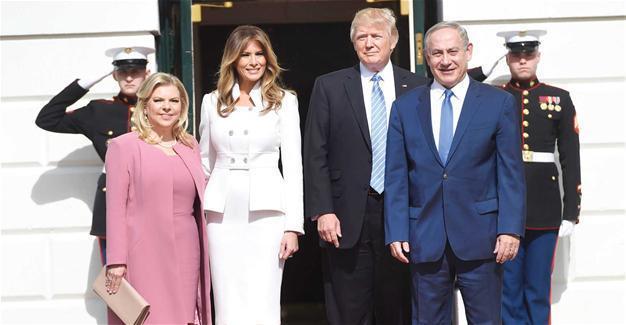Trump drops US commitment to ‘two-state’ Mideast deal
WASHINGTON

U.S. President Donald Trump shelved Washington’s years-long quest for a two-state solution to the Israeli-Palestinian conflict on Feb. 15, saying he would back a single state if it led to peace.
The new president warmly welcomed Israel’s Prime Minister Benjamin Netanyahu to the White House and hailed the “unbreakable” bond between their countries.
And while he urged Netanyahu to “hold back” from building Jewish settlements for a “little bit,” Trump broke with international consensus insisting on a future that included a Palestinian state alongside Israel.
“So I’m looking at two-state and one-state, and I like the one that both parties like. I’m very happy with the one that both parties like,” he said. “I can live with either one.”
Trump said he had thought a two-state solution “looked like it may be the easier of the two. But honestly, if Israel and the Palestinians are happy, I’m happy with the one they like the best.”
This change in the U.S. stance was calculated to please Netanyahu and his right-wing coalition.
“I think the Palestinians have to get rid of some of that hate that they’re taught from a very young age,” Trump said, echoing Netanyahu’s argument that the Palestinians are not ready for peace.
Netanyahu had warm words for the Israeli-U.S. alliance, and hammered home his own prerequisites for peace.
“First, the Palestinians must recognize the Jewish state. They have to stop calling for Israel’s destruction,” he said.
“Second, in any peace agreement, Israel must retain the overriding security control over the entire area west of the Jordan River.”
This region contains the entire West Bank area that would represent the heart of any Palestinian state as conceived in all previous international agreements.
The previous U.S. administration of Barack Obama had warned Israel that if it did not reach a two-state deal with the Palestinians, it would never reach an accommodation with the Arab world.
But Netanyahu insisted he was already developing closer security ties with his Sunni neighbors, who share Israel’s concerns about Iranian subversion and “radical Islam.”
And he urged Trump’s administration to get on board.
“For the first time in the life of my country, Arab countries in the region do not see Israel as an enemy, but increasingly as an ally,” he told Trump.
“I believe that under your leadership, this change in our region creates an unprecedented opportunity to strengthen security and advance peace.”
In a joint statement, the two sides proclaimed “a new day” in U.S.-Israel relations and that there was “no daylight” between them.
Whatever the view in Cairo and Riyadh, the shift in Washington’s position, which was revealed overnight by a White House official, triggered Palestinian despair and consternation in international capitals.
The second-ranking official in the Palestine Liberation Organization, Saeb Erekat, denounced it as an attempt to “bury the two-state solution and eliminate the state of Palestine.”
And he implicitly warned Israelis that any single nation that emerged would not be specifically Jewish.
“There’s only one alternative,” he told a news conference. “A single democratic state that guarantees the rights of all: Jews, Muslims and Christians.”
 U.S. President Donald Trump shelved Washington’s years-long quest for a two-state solution to the Israeli-Palestinian conflict on Feb. 15, saying he would back a single state if it led to peace.
U.S. President Donald Trump shelved Washington’s years-long quest for a two-state solution to the Israeli-Palestinian conflict on Feb. 15, saying he would back a single state if it led to peace.